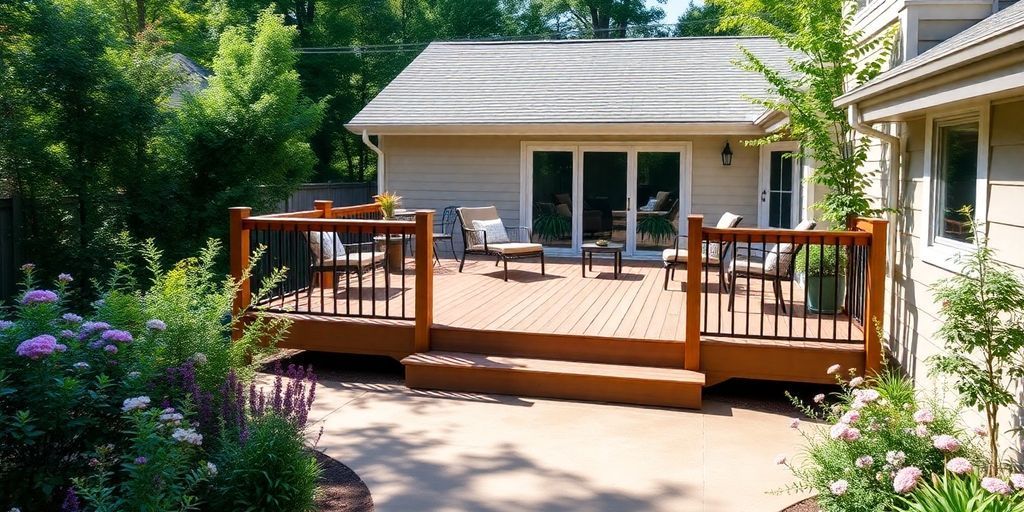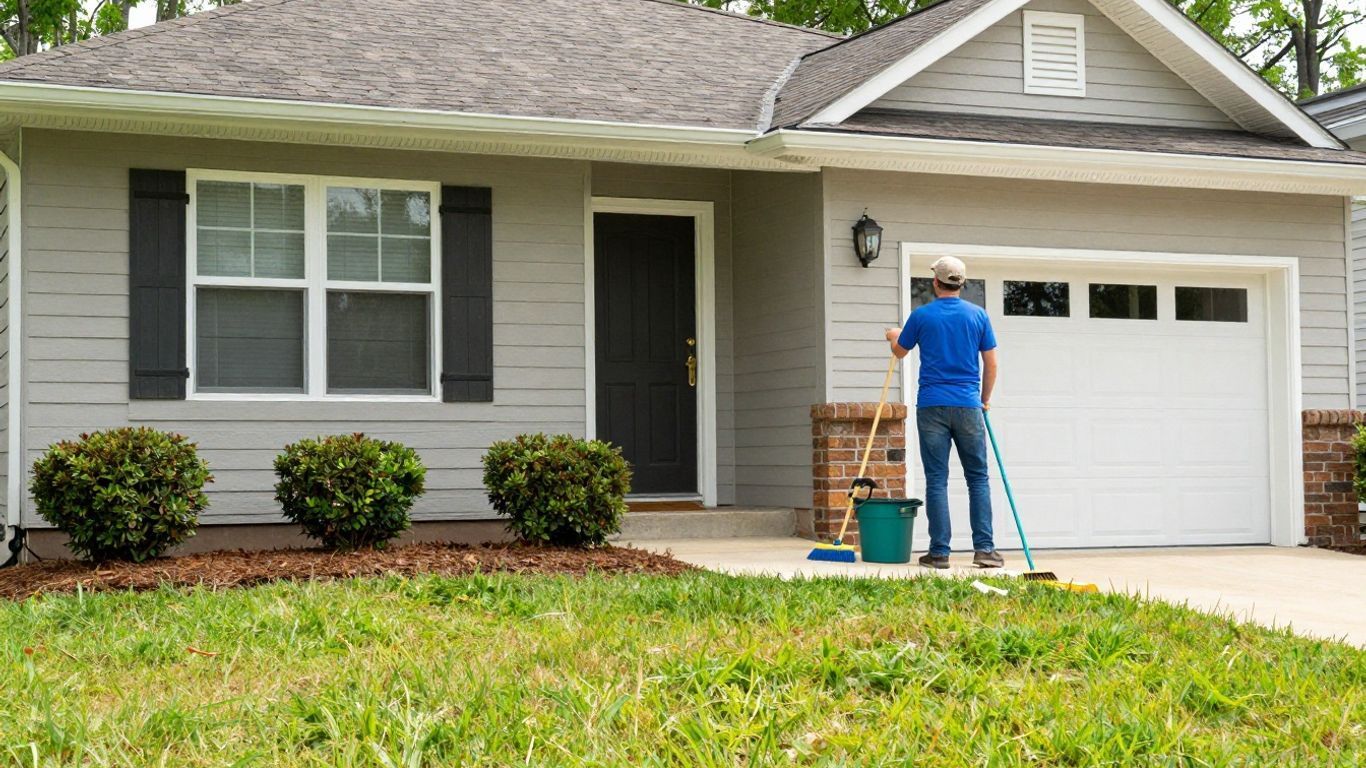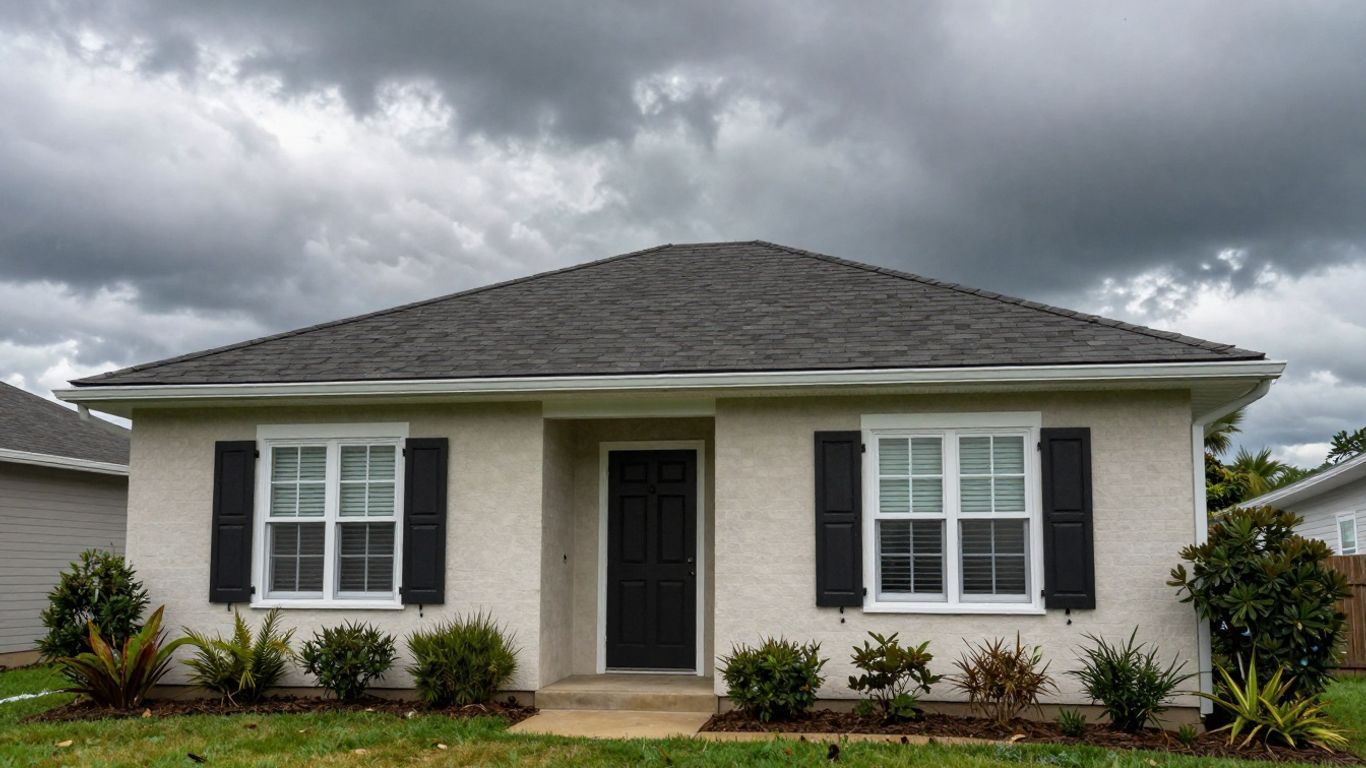How Much Does a New Deck Cost in Georgia? 2025 Pricing for LaFayette, Dalton & Northwest GA Homes

Thinking about adding a deck to your home in Northwest Georgia? You're not alone! A new deck can really enhance your outdoor space, but it's good to know what you're getting into cost-wise. In this article, we'll break down the average cost of a deck in LaFayette, Dalton, and the surrounding areas for 2025. From materials to labor, we’ll cover everything you need to know to make an informed decision.
Key Takeaways
- Deck costs vary based on materials, size, and design.
- Wood, composite, and vinyl are popular decking materials in the area.
- Labor costs can differ significantly between LaFayette and Dalton.
- Seasonal factors can affect both pricing and availability of materials.
- Understanding local regulations is crucial to avoid unexpected costs.
Factors Influencing Deck Costs
Building a new deck isn't cheap, and a bunch of things can change the final price. It's more than just wood and nails; let's break down the main factors that'll affect how much you spend on your new outdoor space.
Material Selection
The type of material you pick for your deck is a huge cost driver. Wood is often the most affordable upfront, but it needs regular upkeep. Composite decking, on the other hand, costs more initially but lasts longer and requires less maintenance. Vinyl is another option, known for its durability. Each material has its own price point and lifespan, so think about what fits your budget and how much work you're willing to put in over the years. Consumer Reports says wood decking is the safest option.
Size and Design Complexity
Obviously, a bigger deck means more materials, which translates to a higher price. But it's not just about square footage. The design also plays a big role. A simple rectangular deck will be cheaper than one with curves, multiple levels, or built-in features like benches or planters. Custom designs require more labor and specialized materials, so keep that in mind if you're dreaming of something fancy.
Labor Costs
Don't forget about the cost of labor! This can vary depending on where you live and the experience of the contractor you hire. Labor costs include:
- Demolition of any existing structure
- Framing the deck
- Installing the decking boards
- Adding railings and stairs
- Finishing touches like staining or sealing
Getting quotes from several contractors is always a good idea to compare prices and find someone who fits your budget. Remember that the cheapest option isn't always the best; consider their reputation and experience too. A skilled contractor can save you money in the long run by doing the job right the first time.
Popular Deck Materials in Northwest Georgia
Choosing the right material for your deck is a big deal. It affects how it looks, how long it lasts, and how much upkeep it needs. Here in Northwest Georgia, we have some specific things to think about, like the weather and what's available locally. Let's look at some popular choices.
Wood Decking Options
Wood is a classic choice, and it's easy to see why. It looks great and feels natural underfoot. But not all wood is created equal. Here are a few options:
- Pressure-Treated Pine: This is probably the most budget-friendly option. It's treated to resist rot and insects, but it can still warp or crack over time. You'll need to stain or seal it regularly. It's a good starting point if you're on a tight budget, but be prepared for more maintenance. You can find treated wood at most local lumberyards.
- Cedar: Cedar is naturally resistant to rot and insects, so it lasts longer than pine. It also looks beautiful with its reddish color and distinct grain. It's a bit more expensive, but the lower maintenance can make it worth it. Just be aware that it can fade to gray over time if you don't stain or seal it.
- Redwood: Similar to cedar, redwood is naturally durable and beautiful. It's often a bit pricier than cedar, but some people prefer its darker color. Like cedar, it needs to be sealed to maintain its color.
Composite Decking Benefits
Composite decking is made from a mix of wood fibers and plastic. It's designed to look like wood but be much more durable and low-maintenance. Here's why it's a popular choice:
- Low Maintenance: No staining, sealing, or painting needed. Just wash it off occasionally.
- Durability: Resists rot, insects, and fading.
- Variety of Colors and Styles: You can find composite decking in almost any color and style you can imagine.
Composite decking can be more expensive upfront than wood, but the lower maintenance costs can save you money in the long run. Plus, it's often made from recycled materials, so it's an eco-friendly choice.
Vinyl Decking Durability
Vinyl decking is another low-maintenance option. It's made from PVC plastic and is completely waterproof. Here are some things to consider:
- Waterproof: Great for areas around pools or hot tubs.
- Low Maintenance: Like composite, it doesn't need staining or sealing.
- Heat: Vinyl can get hot in direct sunlight, so consider a lighter color or using it in shaded areas. Consider adding aluminum railing for extra durability.
Choosing the right material depends on your budget, your style, and how much time you want to spend on maintenance. Think about what's important to you and do some research to find the best fit for your Northwest Georgia home.
Average Cost Breakdown for Deck Installation
Material Costs Overview
Okay, so let's break down where your money actually goes when you're building a deck. The biggest chunk, usually, is the materials. Think about it: wood, composite, vinyl, screws, nails, flashing, railing posts, the actual railing... it all adds up fast. The type of material you choose will drastically change the price. Pressure-treated lumber is going to be way cheaper upfront than, say, composite decking, but remember to factor in long-term costs like maintenance and lifespan. Don't forget about the little things either, like the cost of fasteners – using high-quality screws can prevent issues down the road.
Labor Costs in LaFayette and Dalton
Labor costs can vary quite a bit depending on where you are in Northwest Georgia. In areas like LaFayette and Dalton, you might find slightly different rates based on the demand and the experience of the contractors. Generally, labor will be a significant portion of your overall deck cost, often rivaling the material expenses. It's always a good idea to get multiple quotes from different contractors. Ask them to break down their labor costs so you can see exactly what you're paying for. Things that can affect labor costs include:
- The complexity of the design
- The size of the deck
- The ease of access to the build site
Permitting and Inspection Fees
Don't forget about permits! You absolutely need to get the right permits before you start building your deck. It's not worth the risk of getting fined or having to tear down your deck later. Permit costs vary by county and even by city within Northwest Georgia. Expect to pay a few hundred dollars for the permit itself. Then, there are inspection fees. A building inspector will need to come out and check the deck at various stages to make sure it's up to code. These inspections usually have a fee associated with them. Make sure you factor these costs into your budget upfront so you're not surprised later on.
Ignoring permits can lead to hefty fines and potential legal issues. Always check with your local building department to understand the specific requirements and costs associated with deck construction in your area. It's a small price to pay for peace of mind and a structurally sound deck.
Seasonal Considerations for Deck Building
Best Time to Build a Deck
Honestly, figuring out when to build a deck is all about the weather. In Northwest Georgia, you've got to think about the heat and the rain. Spring and fall are usually your best bets. The temperatures are milder, which makes working outside way more bearable. Plus, you're less likely to run into those crazy summer thunderstorms that can really put a damper on things.
- Spring (April-May): Pleasant temperatures, fewer rain delays.
- Fall (September-October): Similar to spring, plus you get to enjoy your new deck before winter.
- Summer (June-August): Hot and humid, more rain, potential for delays.
Weather Impact on Costs
Weather can seriously mess with your deck-building budget. Rain delays mean your contractor might have to charge you more for labor. Plus, certain materials can be affected by extreme temperatures or moisture. For example, wood can warp or crack if it's exposed to too much sun or rain before it's properly sealed. It's a good idea to factor in a little extra wiggle room in your budget for unexpected weather-related issues. Also, make sure your deck footings are properly installed to avoid issues.
Material Availability Fluctuations
Sometimes, the time of year can affect the availability and price of certain decking materials. For example, lumber prices can fluctuate depending on demand and supply. If there's a big storm somewhere that damages a lot of trees, that can drive up the cost of wood. And certain types of composite decking might be more popular or harder to find at different times of the year. It's always a good idea to check with your local lumberyard or decking supplier to see what's in stock and what the current prices are before you start your project.
Building a deck in the off-season might mean you can snag some deals on materials or labor, as contractors might be looking to fill their schedules. However, be prepared for potential delays due to weather, and make sure to protect any materials stored on-site from the elements.
Comparing DIY vs. Professional Deck Installation
Cost Savings of DIY
Okay, so you're thinking about building your own deck. The big draw? Saving money, right? Absolutely. You skip those labor costs that can really add up when you hire a pro. Think about it: no hourly rates, no contractor fees, just you and the materials. But, and this is a big but, accurate budgeting is key. You need to factor in every single screw, every board, and every tool you might need to buy or rent.
- No labor costs
- Control over spending
- Potential for significant savings
Risks of DIY Projects
DIY projects can be great, but let's be real, they're not always smooth sailing. Building a deck isn't like assembling IKEA furniture. There's a lot that can go wrong, and mistakes can be costly. One wrong cut, one miscalculated measurement, and suddenly you're buying more materials. Plus, there's the time commitment. What might take a professional a few days could take you weeks, especially if you're only working on it in your spare time. And don't forget about the potential for injuries. Working with power tools and heavy materials can be dangerous if you're not careful.
- Potential for costly mistakes
- Significant time commitment
- Risk of injury
Benefits of Hiring Professionals
So, why hire a professional? Well, for starters, they know what they're doing. They've built decks before, probably hundreds of them. They have the experience and the tools to get the job done quickly and efficiently. A professional ensures the deck is built to code and is structurally sound. Plus, they handle all the permits and inspections, which can be a real headache. And let's not forget the warranty. Most professional deck builders offer a warranty on their work, so if something goes wrong, you're covered.
- Expertise and experience
- Ensured code compliance
- Warranty protection
Hiring a professional deck builder can seem expensive upfront, but it often saves money in the long run. They minimize errors, ensure structural integrity, and handle all the necessary paperwork, providing peace of mind and a deck that lasts for years to come.
Local Regulations and Permits in Georgia
Understanding Local Building Codes
Okay, so you're thinking about building a deck. Awesome! But before you even pick out your lumber, you gotta wrap your head around local building codes. These codes are basically rules that make sure your deck is safe and sound. They cover everything from the size of the posts to how far apart the railings need to be. It's super important to check with your city or county's building department because these codes can vary quite a bit from place to place. Don't just assume what worked for your buddy in another town will fly in LaFayette or Dalton.
Permit Costs in Northwest Georgia
Alright, let's talk money. Getting a permit isn't free, unfortunately. The cost of a building permit in Northwest Georgia can depend on a few things, like the size of your deck and the overall value of the project. Expect to pay anywhere from a couple hundred to several hundred dollars. Call your local building department to get the exact figures. Also, keep in mind that if you start building without a permit and get caught, you could face some hefty fines. Not worth the risk, trust me.
Impact of Regulations on Overall Costs
Regulations can definitely impact the overall cost of your deck project. Here's how:
- Material Requirements: Codes might dictate specific types of materials you need to use, which could be more expensive than what you originally planned.
- Design Changes: You might have to tweak your design to meet code requirements, adding to labor and material costs.
- Inspection Delays: If inspections aren't scheduled promptly, it can delay your project and potentially increase labor costs.
Ignoring local regulations can lead to costly rework, fines, or even having to tear down your deck. Always prioritize compliance to avoid these headaches.
So, yeah, dealing with regulations might seem like a pain, but it's a necessary part of the process. Make sure you do your homework and get all the necessary permits before you start building. It'll save you a lot of trouble in the long run. Compliance is key!
Maintenance Costs for Decks Over Time
Annual Maintenance Expenses
Okay, so you've got your awesome new deck. Now what? It's not a 'set it and forget it' kind of deal. You're gonna have some upkeep. Think of it like owning a car – you need to change the oil, right? Decks are similar. A basic cleaning once or twice a year is a must. We're talking sweeping off leaves and debris, maybe scrubbing with some soap and water. You might also need to re-stain or seal it every few years, depending on the material. Expect to spend a couple hundred bucks each year, give or take, for cleaning supplies and maybe some minor repairs. It's way better than letting it rot and having to replace the whole thing!
Long-Term Care for Different Materials
Different deck materials have different needs. Wood decks, especially pressure-treated pine, are pretty common around here. They're relatively cheap to install, but they need more love long-term. You'll be staining or sealing them every year or two to keep the water out and prevent rot. Composite decks are a bit pricier upfront, but they're lower maintenance. You might just need to clean them every now and then. Vinyl decks are even easier – basically, just hose them off. The initial material choice really impacts how much time and money you'll spend on maintenance over the years. Think about that when you're making your decision!
Impact of Climate on Deck Longevity
Northwest Georgia weather can be brutal on decks. We get hot, humid summers and cold, sometimes snowy winters. All that moisture can really mess with wood, causing it to warp, crack, and rot. The sun can fade the color and dry out the wood too. Proper sealing and staining are super important to protect your deck from the elements. Also, make sure to clear off snow and ice in the winter to prevent damage. It's a bit of work, but it'll keep your deck looking good for years to come.
Living in LaFayette or Dalton means your deck will face some weather challenges. Regular maintenance is key to extending its lifespan. Ignoring it will lead to costly repairs or even replacement down the road. Plan for it in your budget!
Taking care of your deck can cost a lot over time. Regular maintenance is important to keep it looking good and lasting longer. If you want to learn more about how to save money on deck upkeep, visit our website for helpful tips and advice!
Wrapping It Up
So, there you have it. Building a new deck in Georgia can really vary in cost, depending on where you live and what you want. In LaFayette, Dalton, and the surrounding areas, you might be looking at anywhere from a few thousand to over ten grand. It all comes down to materials, size, and any extras you want to add. If you're thinking about a deck, make sure to get a few quotes and do your homework. It’s a big investment, but it can really boost your home’s value and your enjoyment of your outdoor space. Just remember, take your time and plan it out right!
Frequently Asked Questions
What factors affect the cost of building a deck in Georgia?
The cost of a deck can change based on the materials you choose, the size and design of the deck, and how much you pay for labor.
What are the best materials for decks in Northwest Georgia?
Common materials include wood, composite, and vinyl. Each has its own benefits like durability and maintenance needs.
How much should I expect to pay for deck installation?
The average cost includes materials, labor, and any permits needed. Prices can vary widely depending on your choices.
When is the best time to build a deck?
Spring and early summer are great times to build a deck, but be aware that weather can affect the cost and timing.
Should I build my deck myself or hire a professional?
Building it yourself can save money, but it can also be risky. Hiring a pro can ensure it's done right.
Do I need a permit to build a deck in Georgia?
Yes, you usually need a permit. It's important to check local building codes to avoid any issues.


